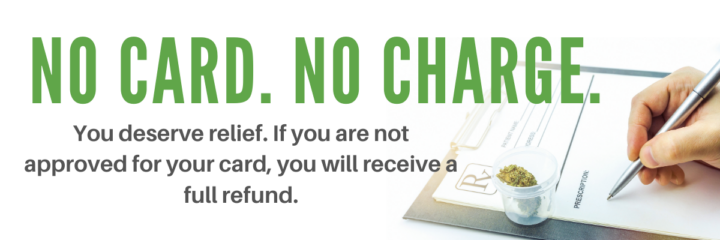

Managing Chronic Pain with Medical Marijuana in Florida
Chronic pain is one of the qualifying medical conditions for obtaining a Florida medical marijuana card. What evidence supports the use of medical marijuana as being safe and effective? And how is marijuana used to treat chronic pain? In this article, we’ll answer these questions and direct readers to resources for locating Florida medical marijuana doctors and dispensaries.
As the clinical and anecdotal evidence for medical marijuana’s health benefits mounts, lawmakers in 35 states have opted to legalize cannabis for the treatment of a wide variety of qualifying medical conditions. Florida is one of more than 30 U.S. states that permits doctors to award medical marijuana cards to patients specifically for treating chronic, non-malignant pain.
Chronic non-malignant pain afflicts more than 50 million Americans. Almost two-thirds of legitimate medical marijuana patients are utilizing cannabis to relieve chronic non-malignant pain. This is especially the case here in Florida where we have the oldest population in the country.
Chronic non-malignant pain is any persistent, recurring pain not attributable to cancer. Numerous afflictions are known to perpetuate chronic pain. Repetitive movements or injuries may result in relentless neck, back, joint, and nerve pain. Systemic conditions such as neurodegenerative disease, arthritis, bursitis, tendinitis, endometriosis, fibromyalgia, and IBD are also common culprits responsible for chronic non-malignant pain.
There are only a handful of options for patients dealing with chronic pain in Florida, and many of those traditional medications come with a host of unpleasant side-effects. Over-the-counter medications can offer short-term relief. However, when taken for a long period, these medicines can aggravate gastrointestinal issues and cause liver damage. Prescription opioids are dangerously addictive, and corticosteroids are known to cause fluid retention, swelling in lower legs, high blood pressure, psychological effects (memory lapses, confusion, delirium), and upset stomach.
Is there any evidence that medical marijuana might provide a more effective and safer way to treat non-malignant chronic pain?
Does medical marijuana provide relief from chronic non-malignant pain?
Several randomized, controlled trials have been conducted to answer this question. In fact, 18 separate trials were performed between 2003 and 2010 involving a total of 766 participants. Of the eighteen trials conducted, fifteen reported that subjects enjoyed profound relief. The participants in the trials suffered from a range of non-malignant conditions including fibromyalgia, rheumatoid arthritis, neuropathic pain, and mixed chronic pain.
Medical marijuana products studied in the trial included smoked marijuana and cannabis flower extracts, as well as synthetic cannabinoids nabilone and dronabinol. Participants given cannabis not only claimed significant pain relief but also improved sleep patterns. The participants administered the placebo, on the other hand, experienced no relief from their pain symptoms.
The vast majority of participants in these trials reported no serious side-effects, and treatment was generally well tolerated. Unwanted effects commonly consisted of drowsiness, dizziness, dry mouth, nausea, and disturbances in concentration.
So how does medical marijuana work and how it used as a pain reliever?
How is medical marijuana is used to treat chronic non-malignant pain?
Two specific compounds found in cannabis flowers are known to have pain-alleviating properties. One cannabinoid compound called THC (tetrahydrocannabinol) has intoxicating effects, whereas the other, CBD (cannabidiol) does not.
The ratio of THC to CBD varies greatly from strain to strain and product to product. In many cases, a 50/50 ratio of THC to CBD provides the most benefit. However, some patients fare better with a high-CBD, low-THC strain, and others may find a higher THC content more effective for pain relief. Florida Strain Library
Smokable cannabis flower or vaping cannabis oil are the two fastest methods to relieve pain. However, inhalation is not advisable for all patients as it can lead to respiratory issues and increase blood pressure. There are plenty of other ways to ingest medical marijuana such as extracts and concentrates, cannabis-infused edibles, tinctures, oils, and capsules. Although these delivery methods require more time to reach full effect, their effects are longer lasting.
Cannabis and Chronic Pain, stories from The Medical Cannabis Community - Video
How to get a Florida medical marijuana card for chronic malignant pain
The process of obtaining a Florida medical marijuana card is straightforward. An appointment must be made with a Florida medical marijuana doctor for a patient evaluation. If the patient is approved, the healthcare provider will generally walk the patient through the process of registering with the Florida Medical Marijuana Use Registry. A card should be received via mail within a few weeks at which point the patient will be eligible to purchase medical marijuana at any of the dozens of dispensaries in Florida.
Here in Florida, medical marijuana can be purchased at the dispensary in person or it can be ordered online or by phone for curbside pickup or home delivery.
Patients suffering from non-malignant chronic pain should not purchase medicine without first doing some homework. Medical marijuana patient groups can offer first-hand advice on the best products and delivery methods for particular types of pain and that work within an individual’s lifestyle. It’s also wise to discuss product options with a qualified budtender at their local dispensary before beginning treatment.
Also, keep in mind that hemp-derived CBD oil is essentially THC-free, non-intoxicating, and can be purchased outside of marijuana dispensaries. Patients can also buy CBD oil online for home delivery.

MMJ Patient Registration Form


Sources and additional reading
- Could marijuana be an effective pain alternative to prescription medications?
- Complete Guide to Medical Marijuana in Florida
- Chronic pain most common reason U.S. patients get medical marijuana
- Medical Marijuana and Chronic Pain: a Review of Basic Science and Clinical Evidence
- Marijuana edibles in Florida
- JAMA Network – Medical Marijuana for Treatment of Chronic Pain and Other Medical and Psychiatric Problems
- Journal of Pain – A randomized, placebo-controlled, crossover trial of cannabis cigarettes in neuropathic pain
- The Journal of Pain – Low-dose vaporized cannabis significantly improves neuropathic pain
- MedCard – How Does Medical Marijuana Help With and Treat Chronic Pain?
- British Journal of Clinical Pharmacology – Cannabinoids for treatment of chronic non-cancer pain; a systematic review of randomized trials
- Journal of Pain – Cannabis for the Management of Pain: Assessment of Safety Study
- The Clinical Journal of Pain – The effect of medicinal cannabis on pain and quality of life outcomes in chronic pain: A prospective open-label study








